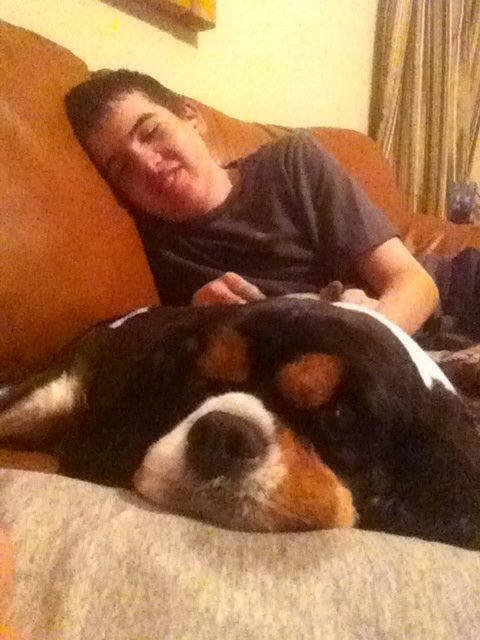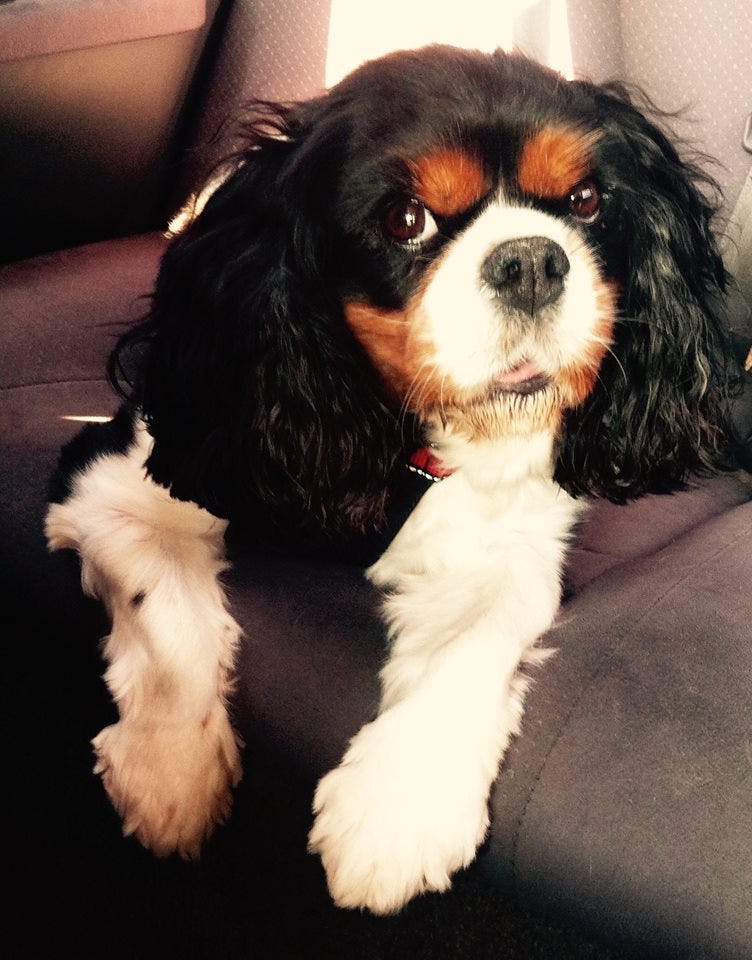I made it to my 20th issue! Not the post I thought I’d write, but here we are… Fair warning, this one is about pet loss. If you listen, be sure to scroll through to see some pictures of our sweet Piper. Thanks for being here.
When our dog Piper became part of our family eight years ago, we weren’t sure our son would tolerate having a pet – he’d developed some fear of dogs after being bitten by one a few years before.
But this sweet-tempered, deaf, and already middle-aged dog was a good fit for our family.
She and my son had a lot in common.
Not long after we had adopted Piper, I found her on the back patio barking at a planter I just had moved to a different location.
She appreciated sameness and routine. I would get reminded by both of my “kids” if I was late on mealtime or promised car rides.
I had them both hovering for possible treats whenever I stepped into the kitchen.
Neither could pass an opportunity to chase a bird into flight if they saw one standing on the ground, at least when they were both younger.
And, they shared a similar attitude when it came to physical affection.
Piper greeted us warmly and took a good ear scratch or two, but would usually reach her limit and move away to lay just beyond arms-reach, no matter how much we coaxed her to come closer.
Just like my kid, she wanted to be near us, but not too near.
Last week, when the vet said it was time to say goodbye to our sweet old dog, I tried to prepare our son for the change ahead.
My son likes to know where my husband and I are, and will repeat our names often when we aren’t in view. He often asks for Piper, too, if she’s not where he expects her to be. I knew this could get tricky.
Looking at other examples online, I wrote a “social story” to explain Piper’s death as simply as I could, without abstract niceties or euphemisms. There would be no “nice farm upstate” or even “crossing the rainbow bridge.”
It had to be kind of blunt to give him a chance to understand that she wasn’t coming back.
Piper has been with us for 8 years… She has been a nice dog for our family.
Now Piper is really sick. She is hurting and coughing… She has a tumor in her belly, and the Vet cannot fix it.
Mom will take Piper to the Vet today. The Vet will help Piper die without any pain.
Dying means that Piper’s heart will stop beating. She will not breath, move, or eat anymore.
She will not be at our house anymore and we will not see her again.
Piper has lived a very long life for a dog.
We will miss her.
Well, we hoped he’d miss her, at least.
We weren’t sure how he was going react. He was never affectionate with her, and often seemed irritated by her habits.
The closest he came to petting her was to fix her ear if it was flopped the wrong way.
Whenever Piper shook her head, like dogs do, it would cause my son to reflexively shake his, too, every time.
We were lucky that she rarely barked, something that my son would not have been able to tolerate. But Piper snored louder than most people. We’d have to wake her up to be able to hear the TV, or each other. Her naps were often cut short by my son who would nudge her (sometimes nicely) when she got too loud.
He didn’t purposely feed her under the table at dinner, but if he got up for seconds, he’d find himself unable to return to his seat until she’d finished grazing for crumbs under his chair.
She was a good dog, and she was also kind of a pain in the butt.
But I knew I would miss her and I knew he probably would, too.
I read him the story and I encouraged him to pet her (a little) and say goodbye.
It will feel strange to not have Piper at our house anymore.
It will take time for us to remember that Piper is gone.
In her final moments, the vet gave Piper forbidden chocolate treats — which was both sweet and sad — and she was happy.
And, of course, in the “comfort room,” when she fell asleep under the anesthesia, she started snoring immediately.
My son didn’t ask for her when I came back from the vet that afternoon, or most of the following day.
It was not until her things started to disappear that he began repeating Piper’s name.
We gave her remaining food and treats away, her bed and her dishes went missing.
And that made him uneasy.
He may not have pet or played with her, but Piper and her “stuff” were very much a presence in his life.
Every morning, he would reset her empty dog dish to the center of her mat and straighten her bed (if she wasn’t in it).
He’d open her bin of food to make sure the scoop was sitting the way he liked it.
Several times a day, he would let her in and out the sliding glass door.
Most evenings, after I’d left her kibble on the counter to soak in water (it had to be softened for our toothless girl), my son would set the bowl down for her, shuffling uncomfortably around her jiggling, excited body. He was not really interested in feeding her but was willing to do it so the dish could be returned to its “correct” position on the floor.
Now, there are empty spaces where the bed and the dish belong.
I keep expecting to see her, too, greeting me in the morning as I pour my coffee,
Or clearing her throat at my office door to remind me it’s dinnertime,
Or snoring under the hall counter among the shoes.
I don’t have to clean up poop in the backyard anymore.
But I have to sweep more under the dining room table.
We are adjusting to new routines.
I guess that’s what grief is: Familiar patterns are broken and it takes time to be at peace with the change.
In the last few weeks of her life, Piper seemed a bit more affectionate. She wasn’t feeling well and stayed closer a little longer for scratches.
Since she’s been gone, my son’s been hanging around closer, too.
He asks for her, and we read the story again, to remind ourselves:
It’s OK to feel sad or confused that Piper doesn’t live with us anymore.
We can look at pictures of Piper and remember her.
Piper was a good dog.










